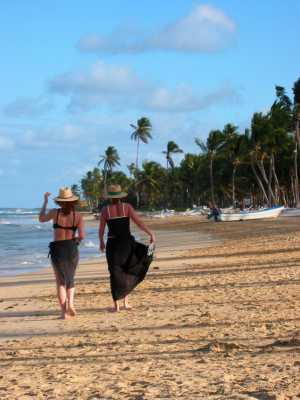 There’s nothing that obliterates happy vacation memories faster than a holiday spending hangover. And it’s all too easy to overspend.
There’s nothing that obliterates happy vacation memories faster than a holiday spending hangover. And it’s all too easy to overspend.
There are countless ways we justify our overspending on holidays: “It’s the only time I’ll ever be here in my life, I deserve this, I’ll never find this to buy at home.”
We know, we’ve used those excuses ourselves and we hear them from our clients.
To help you avoid that holiday hangover, we’re sharing our top tips to help keep spending under control.
Making a plan, checking it twice
You can save a lot of money by booking ahead, whether it’s rentals, hotels or even cell phone roaming. On services like car rentals, it can be more expensive to book a car in Europe than booking from home and paying ahead. Check to see if your credit card or auto club offer travel discounts on services that you can book ahead from home. Planning can spell the difference between a paid-up vacation and one where your spending skyrockets out of control.
While it’s not advisable to carry around wads of cash, when it comes to buying things, paying cash saves us from that temptation to buy now and worry about paying later. And when we’re paying in different currencies, it’s especially easy to delude ourselves into thinking it won’t make a big dent on our budget if we don’t have to count out the cash.
You don’t have to travel far to find pickpockets. But you can be particularly vulnerable when you’re traveling, especially at popular tourist sites where thieves can find lucrative pickings. There are a number of tourist ruses — like the group of youngsters crowding around you in a subway, or the ‘accidental’ drink landing on your clothes, along with solicitous help in which one person fusses over the spill while the other deftly lifts your wallet or other valuables. If you don’t have a hotel safe, stash your credit cards, passport and money inside your clothes, in a money belt or other hidden carrier. Only open that in private — the prospect of having to grope around under your clothes for cash or a credit card is just another incentive to keep your spending to sensible levels.
Let your bank or credit card provider know where and when you’re traveling. Otherwise, your purchases in unexpected locales could trigger a security alert on your account. For large bills, like your hotel or car rental, pre-pay your credit card ahead of time, then pay with your card and save the risk of carrying extra cash. Every withdrawal from a cash machine while you’re traveling in a different country is likely to incur hefty fees so keep withdrawals to a minimum — at the same time balancing that with the knowledge you shouldn’t carry around more than you could truly afford to lose. Check with your bank before you leave what the fees are for withdrawing cash at ATMs where you’ll be.
Even the most careful traveler can arrive home to find a cell phone bill that’s higher than their plane ticket. The culprit? Wireless roaming charges, both for data and for voice. Posting a few photos on Facebook or using Google maps can run up staggering costs, depending on where you’re vacationing. Check with your wireless carrier before you go for roaming packages. Then carefully add up what those few phone calls home or checking email could come to and decide whether or not you can afford to use a cell phone while you’re away. It may be best to leave your phone behind; if not make sure you turn off data roaming. If you’re going to be in one place for long enough — and even a weekend can be long enough to run up a hefty roaming bill — consider taking along an unlocked phone and buying a SIM card for the country you’re in. Even if you pay for a month of local data and voice for a week-long stay, you could find that’s a fraction of what it would cost to use your phone from home.
Travel doesn’t need to mean expensive hotels. There are a lot of alternatives, from home exchanges to apartment rentals or even booking a spare room in a private home. Shopping for food for your own apartment is a fast way to learn about your new surroundings and it helps lighten your restaurant bill. There are a number of excellent web sites that can help in your accommodation planning. Here are a few:
- tripadvisor.com: a good all round travel site, for everything from booking flights to readers’ top-rated things to do. It also has a section on rentals with user reviews.
- slowtrav.com: Slow Travel, excellent reviews and forums from travelers who take the time to savour their destinations. Rentals usually have a week minimum although you can find shorter stays as well.
- airbnb.com: A service for local residents offering accommodation, whether it’s a spare room or a spare villa. Some 1.6 million nights have been booked since Airbnb launched in 2008, so it must be doing something right. It has reviews from users.
- vrbo.com: Vacation Rentals by Owner has user-reviewed rentals, often at lower rates than those charged by a rental service.
- homelink.org: A home exchange service and one of the pioneers in this field.
We hope your summer is a safe, stress-free and happy one. Happy holidays!


